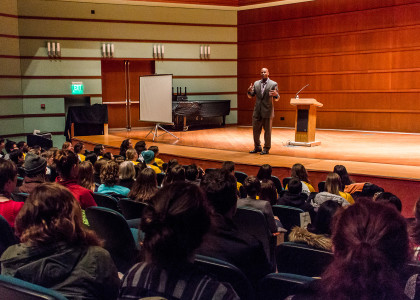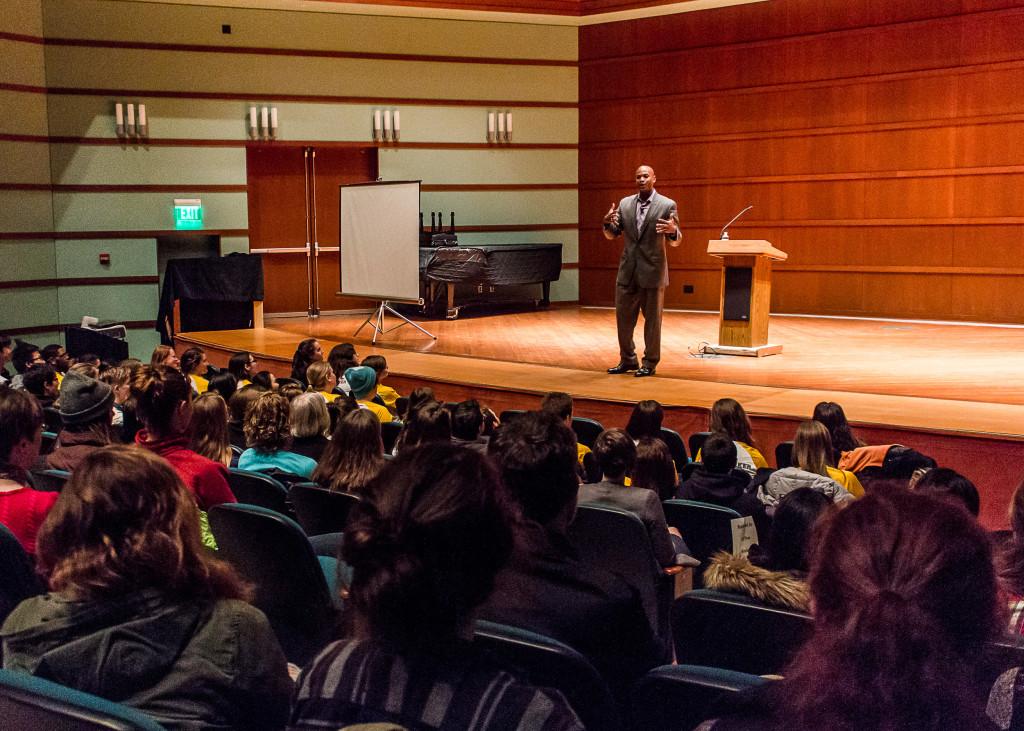
Karol Sadkowski
sadkowsk@grinnell.edu
On Monday, BridgeEDU CEO Wes Moore spoke in Sebring-Lewis Hall about the mission to improve others’ lives through education. Author of the New York Times bestseller “The Other Wes Moore” and Afghanistan combat veteran, Moore was invited to campus by Grinnell’s Careers in Education Professions Program.
During his lecture, Moore described his totally opposite life trajectory from another man coincidentally named Wes Moore. Though both faced challenging upbringings, one Moore studied at Johns Hopkins University, became a Rhodes Scholar and lectured at Grinnell on Wednesday, while the other is serving a life sentence for killing a police officer during an armed robbery.
“Raising kids is amazingly complicated. And when you happen to raise kids in some of the most dangerous and precarious communities of our country, it is that much more complicated,” Moore said. “Potential in this country is universal. Opportunity is not.”
Moore also discussed that what one does with their education is much more important than the education itself.
“What I’m saying is this: ‘What is your major?’ is a question that seems like it has paramount importance right now, and it will quickly fade … The question that will be asked about you long after you are gone is, ‘Who did you choose to fight for?’” he said.
Moore concluded his lecture with two points. First, he said, “Education revives social capital.” He explained that a person with no education has a vastly smaller chance at achieving what they want or need because of their prescribed social standing.
Second, “Education also matters because of expectations.” On this, he said that education allows individuals the freedom to meet their expectations.
After the event, Careers in Education Professions member Isabel Gerber Brydolf ’18 recalled Moore’s discussion of acquired social capital through education: “[I]f your parents didn’t grow up with the resources to make connections for you and you don’t have other people in your life that can help you with that, then you’re at a distinct disadvantage That really resonated with me because my parents do have that social capital. These are advantages I had taken for granted.”
President Kington also attended Moore’s lecture. Relatedly, he spoke to Moore’s personable qualities: “He … has the ability to tell a story in a way that I think the right people will listen to, in a way that they might not otherwise. Because he straddles these worlds. Like many of us straddle these worlds.”
Like Moore, Kington also grew up in Baltimore and managed to accomplish a number of things despite living in a disadvantaged area.
“I grew up in a very tough neighborhood. I had the fortune of having an educated family, but my parents refused to move out when desegregation occurred. They said, ‘No, you have to stay here. This is your community.’”
Moore also spoke to his observations serving the U.S. Army in Afghanistan.
“To understand Afghanistan and the situation the country finds itself in, you have to understand the role that education has played or has not played in said society,” he said.
“If you show me a society where education is not something that is treasured or believed in, if you show me a society where there are massive barriers against being able to educate women and girls, etc, you’re also showing me a society that is going to have a very difficult time with any type of success measures,” he said. “And that’s where conflict and disillusionment become commonplace. So, I think it’s something that has to be a priority not just for what’s happening here.”































































